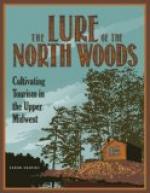Drummond’s face got red and he clenched his fist, for he had already told his tale to people who heard it with amused incredulity.
“You promised you would make me rich and I’ve thrown up my job! I’ve got about five dollars and don’t know what to do!”
“Well,” said Stormont coolly, “there’s an employment agent a few blocks up the street and as trade’s pretty good it’s possible he can find you a post. That’s about the only thing I can think of and I’m occupied just now—”
Drummond stopped him with a savage gesture and walked out of the room.
“We have fixed him; I guess he won’t bother us again,” Stormont remarked.
After leaving the office, Drummond wandered moodily along the avenue and presently came to a square, past which rows of pretty wooden houses surrounded by poplars, ran towards the river bank. The snow had gone, the afternoon was warm, and finding a bench in the sun, he sat down to think. His character was complex and his thoughts involved, for he had inherited something from ancestors of different type. A touch of Indian vanity and French expansiveness was balanced by his father’s Scottish caution and the Indian’s stolid calm. Sometimes he was rash and impulsive, and sometimes strangely patient, but he seldom forgot an injury.
It was obvious that he had been cheated and in the meantime could get no satisfaction for the wrong he had been done. What he knew about the silver ore was worth something while he alone had the secret, but now he had told somebody else its value had disappeared. It was, however, a comfort to reflect that he had not been altogether frank with Stormont; he had kept something back that would be a useful guide when one looked for the creek. His recollection of this was hazy, but he would think about it later.
On the whole, Drummond thought Stormont had not found the ore. A hint of anger in his ironical amusement implied that he had come back disappointed; and if he imagined he had got on the right track, he would, no doubt, have been willing to pay another fifty dollars. For all that, Watson and Stormont had plotted to win his confidence, make him drunk, and find out all he knew, and this indicated that the fellow thought the vein worth looking for. When Stormont got over his disappointment he would try again.
Drummond saw that he could embarrass Stormont by selling the secret he had been cheated of to somebody else. It was amusing to think of two parties looking for the vein; the difficulty was that he did not know anybody likely to be a buyer. But he could wait, since it looked as if he had put Stormont off the track, and by and by he might find a speculator willing to believe his tale. Sooner than let Stormont locate the vein he would give, for nothing, any antagonist of the latter’s all the help he could.
Then he remembered that he had only a few dollars and must find some work soon. Supper would not be served at the cheap hotels for an hour yet and he set off to look for an employment agent. The man charged a dollar and gave him a card with an address, remarking that Drummond ought to get a job, as business was good. Drummond went back up the avenue, and presenting the card at a big store, was engaged for a week and promised a post afterwards if the department boss was satisfied.




